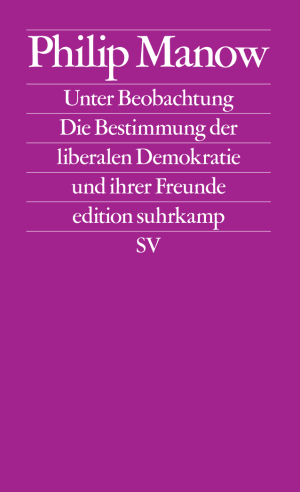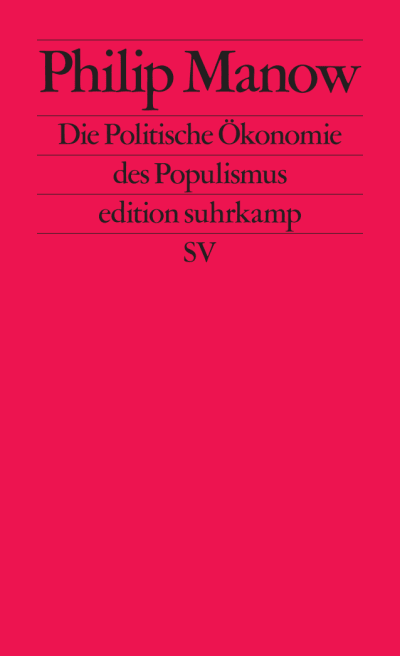The Political Economy of Populism
Populism is a multifarious phenomenon. Sometimes from the right, sometimes from the left; sometimes it articulates a protest against open markets, sometimes it turns against migration. Also in its geographic distribution it is rich in variance: in southern Europe leftist populism holds sway, in northern Europe that of the right. Philip Manow develops a comparative explanation for this initially contradictory-seeming picture.
The trigger is created by the respective economic...
Populism is a multifarious phenomenon. Sometimes from the right, sometimes from the left; sometimes it articulates a protest against open markets, sometimes it turns against migration. Also in its geographic distribution it is rich in variance: in southern Europe leftist populism holds sway, in northern Europe that of the right. Philip Manow develops a comparative explanation for this initially contradictory-seeming picture.
The trigger is created by the respective economic models of growth, the composition of the labour market and the social state, and, in short, the respective political economy. It becomes clear: Whoever wants to talk about populism but leaves out capitalism, will always end up with identity politics – and will inevitably themselves become party to the conflict.
»Philip Manow, one of Europe’s comparatively and historically most adept and most perceptive political scientists, presents an interesting and strident text on the roots and manifestations of populistically mobilizing parties.« Silja Häusermann, Frankfurter Allgemeine Zeitung
»Philip Manow’s book makes an important contribution to better grasp the economic reasons of those who turn away from the democratic institutions and from the project of European unity. In doing so, it also opens new pathways to political practice.« Albrecht Koschorke, Neue Zürcher Zeitung
»Those who don’t want to stare at the television screen aghast on this year’s election eves should read this thin, analytically clear and pleasantly polemic book beforehand.« Jens Bisky, Süddeutsche Zeitung
»The magnitude of this slim volume has as much to do with its architecture as its many concrete conclusions: The Political Economy of Populism is in fact always something other, depending on the context one applies. … Manow does not provide us with all the answers, but a key which, not least, will help unlock the election year of 2019.« Bert Rebhandl, Der Standard
»Philip Manow’s new book is both an analysis and a provocative essay at the same time. And it provides a convincing explanation of the curious north-south split among European manifestations of populism.« Makroskop
»Even where one might care to disagree or even add something, The Political Economy of Populism is a shrewd, greatly inspiring book; in its analytical cool it is also far cry from the hysterical tone which, from the right as well as the left, all too often colours the debate.« Deutschlandfunk Kultur
»The Political Economy of Populism is not an apology of populism. What Manow shows is that it’s less of a disease and more of a symptom. A symptom that shows how badly we are equipped for a globalization on which we ultimately depend.« der Freitag
»Germany’s political scientist of the hour« Schweizer Monat
»Manow refers to economic developments without simply pointing out ›neoliberalism‹, which other explanatory models have dealt with at length. He also regards populism as a phenomenon that doesn’t exclusively belong to the political right-wing, but also to the left, without making a superficial equalisation. Moreover, his explanation proceeds in a reflected and systematic manner and always takes into account opposing opinions.« Humanistischer Pressedienst
»While the ruling classes preach the mantra of integration, the lower ranks are filled by Euroskeptics. The demand for populistic protest remains great. With Manow’s political economics it loses its moral appeal. If you talk about populism, you can no longer not talk about capitalism.« FALTER
»The book offers a wealth of precise data and observations as well as intelligent reflections on a phenomenon that is sure to keep us occupied for a long time. […] A book absolutely worth reading!« Werner Bührer, Francia-Recensio
»Philip Manow, one of Europe’s comparatively and historically most adept and most perceptive political scientists, presents an interesting and strident text on the roots and manifestations of populistically mobilizing parties.« Silja Häusermann, Frankfurter Allgemeine Zeitung
»Philip Manow’s book makes an important contribution to better grasp the economic reasons of those who turn away from the democratic institutions and from the...
DISCOVER
Philip Manow Shortlisted for the Tractatus-Preis 2024
Philip Manow has been shortlisted for the Tractatus-Preis 2024 for his book Under Observation.DISCOVER
Philip Manow Shortlisted for the Tractatus-Preis 2024
Philip Manow has been shortlisted for the Tractatus-Preis 2024 for his book Under Observation.Persons
OTHER PUBLICATIONS

Under Observation
When, and in whose interests, did the concept of liberal democracy become politically meaningful? And what is the connection between our analytic concepts and the institutional contexts and the...
Poland (Wydawnictwo Instytutu Zachodniego)

(Un-)Democratising Democracy
Democracy versus democracy – illiberal versus liberal, direct versus representative democracy, maybe even »the people vs. democracy«? It seems as though democracy has never been as...
Domestic Rights Sales: German Audiobook (CC Live)

In the King's Shadow
English world rights (Polity)
Previously published in the respective language / territory; rights available again: Russia (Gaidar Institute for Economic Policy)
